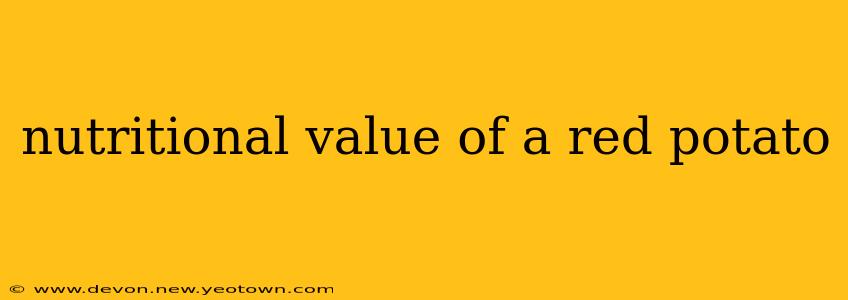The red potato. Often overshadowed by its russet and Yukon gold cousins, this vibrant spud quietly boasts a nutritional profile that's anything but ordinary. From its vibrant skin to its subtly sweet flesh, the red potato offers a surprisingly diverse range of vitamins, minerals, and antioxidants, making it a worthy addition to any healthy diet. Let's peel back the layers (pun intended!) and explore the nutritional riches within this unassuming tuber.
What are the health benefits of eating red potatoes?
The health benefits of red potatoes stem directly from their impressive nutrient composition. They're a good source of complex carbohydrates, providing sustained energy throughout the day, unlike simple sugars that lead to energy crashes. Beyond that, red potatoes are packed with essential vitamins and minerals crucial for various bodily functions. These include vitamin C, which acts as a powerful antioxidant, potassium, vital for maintaining healthy blood pressure, and dietary fiber, promoting healthy digestion. The vibrant red color hints at their high anthocyanin content, potent antioxidants linked to reduced risk of chronic diseases.
How many calories are in a medium red potato?
A medium-sized red potato (about 5.3 ounces or 150 grams) generally contains around 110 calories. This calorie count can vary slightly based on the potato's size and growing conditions. Remember, however, that preparation methods significantly influence the final calorie count. Adding butter, sour cream, or oil to your baked or mashed potatoes will inevitably increase the overall calorie intake.
What vitamins and minerals are in a red potato?
Let's delve into the specific vitamin and mineral powerhouse within a single red potato:
- Vitamin C: Red potatoes are an excellent source of this crucial antioxidant, essential for immune function and collagen production.
- Potassium: A significant contributor to maintaining healthy blood pressure levels and electrolyte balance.
- Vitamin B6: Plays a vital role in brain development and function, as well as red blood cell formation.
- Manganese: An essential mineral involved in various metabolic processes, including bone health and wound healing.
- Dietary Fiber: Promotes healthy digestion and helps regulate blood sugar levels.
- Anthocyanins: These powerful antioxidants, responsible for the red color, are linked to various health benefits, including reduced inflammation and improved heart health. They also act as potent free radical scavengers, protecting cells from damage.
Are red potatoes good for weight loss?
While red potatoes are not inherently "weight-loss foods," they can certainly be part of a healthy weight-management strategy. Their high fiber content promotes satiety, helping you feel fuller for longer and potentially reducing overall calorie intake. However, moderation is key. Choosing healthy cooking methods, like baking or boiling, rather than frying, and keeping portion sizes in check are crucial for incorporating red potatoes into a weight-loss diet.
Are red potatoes healthier than white potatoes?
The "healthier" potato is a matter of nuanced comparison. Both red and white potatoes offer similar nutritional benefits, such as carbohydrates and fiber. However, red potatoes boast a significant advantage with their higher concentration of anthocyanins, those beneficial antioxidants linked to numerous health advantages. Ultimately, both varieties can be part of a balanced diet, but the antioxidant boost in red potatoes gives them a slight edge in terms of overall health benefits.
What are some healthy ways to prepare red potatoes?
The beauty of the red potato lies in its versatility. Here are some healthy ways to enjoy this nutritious tuber:
- Baked: A simple yet delicious option, highlighting the potato's natural flavor.
- Boiled: Perfect for adding to salads or as a side dish.
- Roasted: Toss with herbs and spices for a flavorful and satisfying side.
- Mashed (with a twist): Instead of heavy cream and butter, try using Greek yogurt or unsweetened applesauce for a lighter and healthier take on mashed potatoes.
The red potato, often overlooked, deserves a prominent place on your plate. Its nutritional value, versatility, and delicious flavor make it a worthy addition to any healthy eating plan. So next time you're at the grocery store, reach for those vibrant red beauties and discover the hidden nutritional treasure within!

